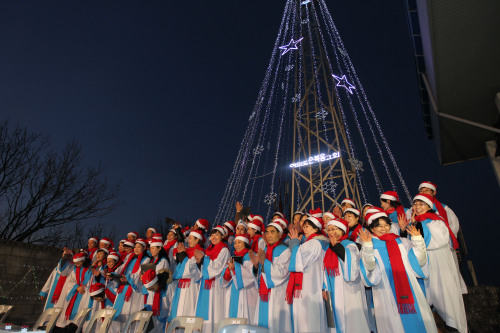The South Korean military was maintaining heightened vigilance for possible North Korean provocations Tuesday, a day after its live-fire exercise on Yeonpyeong Island near the tense western sea border.
It put on the highest alert its troops around Aegibong, a mountain peak located just three kilometers from the North, as a Seoul church held a ceremony Tuesday night to turn on Christmas lights on a steel tower there for the first time in seven years.
The North regards the ceremony as part of the South’s propaganda activities, which sparked concerns that it would attempt to strike down the tower. The annual event at Aegibong was suspended under an inter-Korean military accord -- signed in June 2004 to stop all propaganda activities in the border areas.
Some 400 church members attended the ceremony to turn on some 100,000 LED light bulbs on the tower. Some 80 Marine soldiers along with ambulances and fire engines were dispatched there in case of a possible North Korean attack.
“The Marine troops will secure the safety of civilians participating in the ceremony. They are maintaining their readiness to promptly respond to enemy provocations,” the Ministry of National Defense said in a report to the parliamentary defense committee.

Seoul recently decided to resume the ceremony following a series of North Korean provocations including the March 26 sinking of the Cheonan and the Nov. 23 artillery attack on Yeonpyeong Island. Put together, the two incidents killed 50 South Koreans.
In response to the North Korean provocations, Seoul has said that it would resume psychological warfare such as sending anti-Pyongyang leaflets and using loudspeakers and electronic displays for propaganda activities.
The North has hardened its belligerent rhetoric against the resumption of propaganda activity, saying that it would strike propaganda facilities around the heavily-fortified border.
Meanwhile, President Lee Myung-bak convened a meeting of the National Security Council to discuss measures to deal with security issues following the live-fire drill on Monday.
During the meeting, the council decided to upgrade and expand a presidential advisory body for national security to strengthen the country’s crisis management, Cheong Wa Dae said.
The National Crisis Management Center in its current form was set up in May, following North Korea’s torpedo attack on the South Korean warship Cheonan in March.
The center will be renamed the Office of National Crisis Management with a higher-level presidential aide as its chief, said Kim Tae-hyo, presidential secretary for national security strategy.
The office will consist of three teams in charge of initial responses to crises, information analysis and 24-hour monitoring of situations. The number of its staff members will be raised from 24 to 30.
The national crisis management office will lead NSC meetings in addition to taking emergency measures at times of crisis, while the office of the senior secretary to the president for foreign affairs and national security will continue to deal with related policies and oversee meetings of security-related ministers, Kim said.
The NSC is the president’s principal forum for consulting national security and major foreign policy matters with his senior staff and Cabinet officials. It was the fifth NSC meeting convened by Lee. The previous session was held in May after Seoul concluded that Pyongyang was responsible for sinking the Cheonan.
Although the North did not make additional provocations during Monday’s 94-minute live-fire exercise despite its repeated threats of “deadlier strikes,” the South is keeping close tabs on North Korean military movements.
After the exercise, the North Korean military said in a statement that it did not feel any need to retaliate against “any despicable military provocations.” However, it repeated its usual bellicose warnings of additional “retaliatory strikes.”
“Each military branch is operating a strengthened crisis action team and maintaining vigilance. We are preparing against the enemy’s unpredictable provocations,” the ministry said.
A senior official at the Joint Chiefs of Staff said, “We have maintained the highest alert level for localized provocation, called jindogaehana, for the frontline areas including western border islands and Aegibong.”
Although the live-fire drill ended, the North continues to deploy its surface-to-ship and surface-to-air missiles and maintain its readiness posture in the units on its west coast, officials said.
The SA-2 surface-to-air missies the North has deployed on its west coast have a range of 13-30 kilometers. Its surface-to-ship missiles such as Samlet and Silkworm missiles have a range of 83-95 kilometers.
As for the outcomes of the live-fire drill, the ministry said that through the exercise, the South Korean military showed off its resolve to protect the western frontline islands and the country’s territorial sovereignty.
As to why North Korea did not take any action during the exercise, experts said the North might have elected not to launch another provocation as the South was more determined on a strong counterstrike than before, and because U.S. soldiers were deployed on the island to support the exercise.
During Monday’s exercise, a total of 23 U.S. troops were deployed on Yeonpyeong Island. Nine representatives from New Zealand, Australia, Canada, Britain and Philippines, who belong to the U.N. Command Military Armistice Commission, also came to the island to observe the exercise.
Experts also said that the North was seeking to circumvent international criticism for the Nov. 23 artillery attack and build up momentum for the resumption of the multilateral talks aimed at its denuclearization.
By Kim So-hyun and Song Sang-ho
(sophie@heraldcorp.com) (sshluck@heraldcorp.com)









![[Kim Seong-kon] Democracy and the future of South Korea](http://res.heraldm.com/phpwas/restmb_idxmake.php?idx=644&simg=/content/image/2024/04/16/20240416050802_0.jpg&u=)







![[KH Explains] Hyundai's full hybrid edge to pay off amid slow transition to pure EVs](http://res.heraldm.com/phpwas/restmb_idxmake.php?idx=652&simg=/content/image/2024/04/18/20240418050645_0.jpg&u=20240418181020)

![[Today’s K-pop] Zico drops snippet of collaboration with Jennie](http://res.heraldm.com/phpwas/restmb_idxmake.php?idx=642&simg=/content/image/2024/04/18/20240418050702_0.jpg&u=)